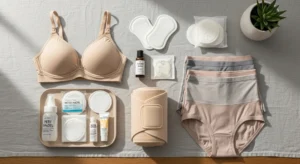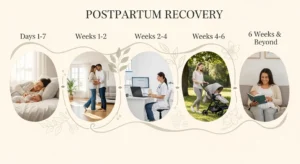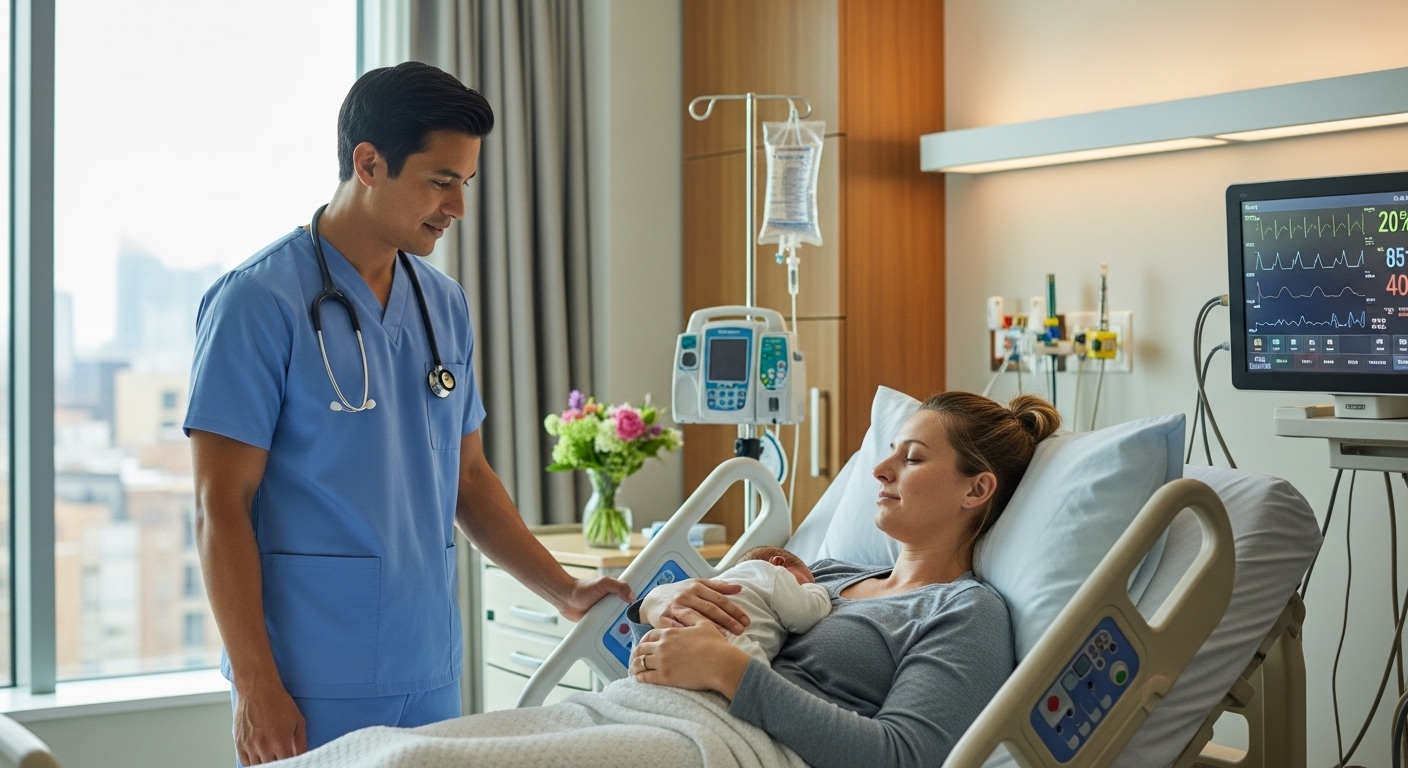After giving birth, one of the most important aspects of adjusting to motherhood is postpartum recovery. The journey of healing after childbirth can be challenging, but with the right tools, products, and tips, new moms can ensure a smooth recovery and feel comfortable as they transition into their new role. This guide will take you through the essential recovery products, health tips, and advice to make your postpartum experience as comfortable as possible. Whether you’re a first-time mom or adding to your growing family, it’s crucial to understand what you need for your postpartum recovery. Prioritizing your well-being is key to feeling your best and fully enjoying the early days of motherhood.
What is Postpartum Recovery?
 Postpartum recovery refers to the period of healing and adjustment that follows childbirth. This phase involves both physical and emotional changes as your body heals from labor and delivery. For some new moms, this period can be overwhelming, as it includes a range of changes that require attention, such as recovering from vaginal or cesarean delivery, adjusting to new hormonal balances, and learning how to care for your newborn.
Postpartum recovery refers to the period of healing and adjustment that follows childbirth. This phase involves both physical and emotional changes as your body heals from labor and delivery. For some new moms, this period can be overwhelming, as it includes a range of changes that require attention, such as recovering from vaginal or cesarean delivery, adjusting to new hormonal balances, and learning how to care for your newborn.
It’s vital for new moms to prioritize their health during this time to ensure they feel their best both physically and mentally. This can include seeking help from family or a healthcare provider, taking time to rest, using appropriate products for healing, and nourishing your body with nutritious food and hydration.
For a more in-depth look at pregnancy and postpartum health, check out our guide on staying comfortable during the first trimester.
Essential Products for Postpartum Recovery
The right products can make a world of difference in your postpartum recovery. Below are some essential items to consider. These products are designed to help with comfort, pain relief, and ease the process of healing. It’s a good idea to invest in these items ahead of time, so you’re prepared when the time comes.
- Postpartum Support Bands: These bands help support your abdominal muscles and reduce discomfort after giving birth. They offer physical support and help promote healing by improving posture and alleviating pressure on the abdomen. Whether you’ve had a vaginal or cesarean delivery, a postpartum support band can make a significant difference in your recovery process.
- Perineal Care Kits: After vaginal delivery, a perineal care kit with ice packs, sprays, and pads can aid in healing and provide comfort to the sensitive area. The perineum can be sore after delivery, and a well-stocked care kit can help soothe pain, reduce swelling, and prevent infection. Many kits also include perineal foam, which can reduce irritation.
- Postpartum Underwear: Comfortable, breathable underwear designed for postpartum recovery helps with comfort and keeps everything in place as you heal. These specialized underwear are typically made of soft, stretchable material that accommodates pads and any necessary medical supplies while also providing support to the abdominal area.
- Breastfeeding Supplies: If you’re breastfeeding, nipple creams, pads, and lactation teas can help make the process smoother and more comfortable. Nipple creams, for example, prevent and soothe irritation from nursing, while lactation teas support milk production. If you’re pumping, be sure to have a high-quality breast pump and storage bottles as part of your essentials.
Self-Care Tips for Postpartum Recovery
Beyond products, self-care is essential for new moms during their postpartum recovery. Your physical and mental health must be taken into consideration as you adjust to life with a newborn. Here are a few key self-care tips to help you heal and feel your best during this important time:
- Rest and Sleep: It’s tempting to care for your baby 24/7, but rest is vital for your recovery. Enlist help from a partner, family members, or friends to take over baby duties while you rest. Lack of sleep can hinder your recovery and emotional well-being, so make sure you’re getting as much rest as you can. Power naps during the day can help, and asking for help from loved ones is an important part of self-care.
- Hydration and Nutrition: Eating well-balanced meals and drinking plenty of water can support your body’s recovery process and improve your energy levels. Focus on eating a variety of nutrient-dense foods, such as fruits, vegetables, lean proteins, and whole grains. This will help replenish your energy, balance your hormones, and support milk production if you’re breastfeeding. Proper hydration also helps keep your skin healthy, aid digestion, and prevent constipation, which can be a common issue postpartum.
- Gentle Exercise: Once you have your doctor’s approval, light activities such as walking or postpartum yoga can aid in your recovery and improve your mood. It’s important not to rush back into intense physical activity, as your body needs time to heal. Start slow and listen to your body as you reintroduce movement. Pelvic floor exercises, such as Kegel exercises, can also help strengthen your muscles after childbirth.
- Emotional Health: Postpartum depression can affect many new moms. It’s important to recognize signs of depression and seek help if necessary. Talking to a counselor or joining a support group can make a big difference in your mental health. If you’re feeling overwhelmed, isolated, or persistently sad, don’t hesitate to reach out to a mental health professional. Postpartum recovery is as much about your emotional health as it is about your physical recovery.
Check out our guide to pregnancy nutrition for tips on eating healthy meals during recovery, which can play a key role in your physical and emotional health.
Postpartum Recovery Timeline
The timeline for postpartum recovery varies for every woman, but there are general stages that most moms experience. These stages are often helpful to understand, as they give a sense of what to expect throughout the recovery process:
- First Few Days: The first few days are focused on healing from delivery. Expect to deal with pain from stitches or cesarean sections, fatigue, and hormonal shifts. The immediate postpartum phase may involve bleeding, swollen breasts, and tenderness. It’s a time to focus on rest and allowing your body to adjust.
- Week 1-2: During this time, your bleeding should start to taper off, and you may begin feeling more like yourself. Many moms find that light exercises such as walking help improve their mood. This is also a time to start focusing on the emotional aspects of recovery and bonding with your baby. Some discomfort may persist, but it’s important to continue resting and recovering at your own pace.
- 1-6 Weeks: You’ll begin to see more physical recovery, but some moms still experience fatigue and emotional shifts during this time. Your doctor may recommend pelvic floor exercises and gentle stretches to help your muscles heal. It’s also when your doctor will typically schedule your postpartum check-up, where they’ll assess your overall recovery and healing.
- 6 Weeks and Beyond: After 6 weeks, most new moms receive their postpartum checkup, and you should start to feel more like yourself. Some moms may experience longer-lasting effects like diastasis recti, which requires specific exercises to treat. If you’re still experiencing pain or discomfort, don’t hesitate to talk to your healthcare provider.
For more support on your postpartum journey, explore our complete list of must-have products for expecting moms to ensure you’re well-equipped for recovery.
Conclusion
Postpartum recovery is a vital part of motherhood that should never be overlooked. With the right products, self-care strategies, and a supportive environment, you can navigate this period with comfort and ease. Take your time to heal, and don’t hesitate to reach out for help when you need it. By prioritizing your well-being, you’ll be better able to care for your newborn and enjoy the journey of motherhood. Remember, recovery is not just physical – emotional support and self-compassion are just as essential during this time.
For further tips on pregnancy and postpartum recovery, visit our guide for expecting dads for a more comprehensive look at your new family dynamic and the essential roles both parents play in the postpartum process.





